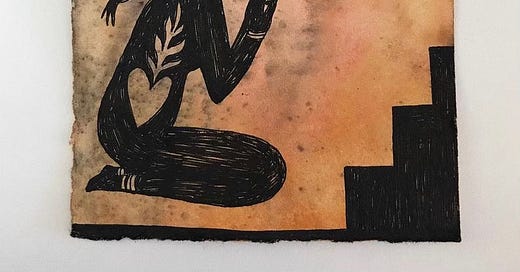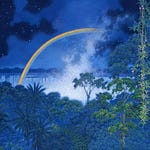Hello y’all,
How does this arrive to you today? Have you had enough water? If not, here’s a prompt to pause and grab a glass if you’re able.
At the bottom of this post you'll see some ways you might want to participate in this week's theme. And I want to shout out Doug Tallamy and James McSweeney for infusing their magic into this post.
Til next time, with immense love, take good care.
Rachel
I kneel to the ground and hover my palm over the surface of the mound in front me. Its emanant warmth radiates into my hand, then ripples a cascade of tingling rapture throughout my whole being. I pause to savor this transient feeling before sinking my hand in to the humid pile. The radiant aliveness churning before me is an irresistible invitation beckoning me to plunge in, and I can't help myself. I want contact. I want to feel this damp and miraculous new world of freshly cured compost between my fingertips. I excavate a hand full and watch the ecstatic dance of glistening Earthworms, mica shimmering gold in the sunlight, countless microorganisms squiggling through indiscernible fragments of former fruits and flowers and leaves.
This precious substance in my palm – humus – is found specifically and only on this singular planet in the known universe. Humus is a component of soil, but my preferred definition is that it is a "biological performance"1. Humus is matter, but it is also constantly in emergence, constantly in its becoming, and therefore it exceeds the static containment of a strangling noun. The cycle is ceaseless: the interminable decomposition of plant and animal material to nourish the everlasting birthplace of all life. Round and round again. Humus is best understood as a verb. A primordial force. And isn't everything sacred best understood the same way? As biological performance, as numinous verb? Earth itself is a verb, so are you, always in motion, ever-changing, inhaling and exhaling, expanding and contracting, dying and rebirthing, as a microcosm of a superorganism and as an entity unto yourself.
I often think about the intricate processes at play within my very skin – the infinite biological performances in motion just beneath the surface. How mysterious that all the wriggling, writhing, vibrating, electrifying orchestrations that make life possible are hidden from view, deep inside us and deep below us. I remember my 5th grade biology course seeding a profound fascination with the organelle mitochondria, the powerhouse of our cells that transforms our food into energy for foundational cellular functioning. Though most of our DNA is held within our cellular nuclei, Mitochondria have their own DNA (mtDNA), and interestingly, it is more similar to bacterial DNA than to human DNA. Mitochondria are also responsible for determining which aging or dysfunctional cells are to be cleared away and destroyed so that new cells can birth. Life and death cycle through the Mitochondrial domain.
As I tend to the farm's compost mounds weekly, I see a mirror. I see life and death cycling through. I see food transformed into energy through the brilliance of bacterial DNA. I remember that a species of soil bacterium, Mycobacterium vaccae, releases serotonin - no different from any SSRI. I feel kinship. I feel my body soften. I feel meditative. I feel held in the divine rhythms and holisitc lifeways that understand that closed-loop systems feel good, they are infused with innate pleasure. They know "waste" is a construct in an artificial, linear, and extractive paradigm that conveniently invented "trash" to scale beyond healthy, sustainable, Earth-based bounds, and is now breaking down the very biological performances that make Earth Earth. The only Earth. A compost pile is a body without skin. And our bodies know we deserve to be held in circles.
“You have noticed that everything an Indian does is a circle, and that is because the power of the world always works in circles, and everything tries to be round. ...Everything the Power of the World does is done in a circle. ...The wind, in its greatest power, whirls. Birds make their nests in circles, for theirs is the same religion as ours. The sun comes forth and goes down again in a circle. The moon does the same and both are round. Even the seasons form a great circle in their changing, and always come back again to where they were. The life of a man is a circle from childhood to childhood, and so it is in everything where power moves. But the (Whites) put us in these square boxes. Our power is gone: we are dying, for the power is not with us anymore. We are prisoners of war while we are waiting here. But there is another world."
- Black Elk, Oglala Lakota leader and shaman 1863 - 1950
This week we saw photographs from Nasa's James Webb Space Telescope that ripped across the internet sparking jaw-gaping awe. William Blake's spirit was also stirred when his words "To see a World in a Grain of Sand ...Hold Infinity in the palm of your hand" accompanied the viral re-shares because we were told to contextualize these photos by imagining that we were holding out just one grain of sand at arm’s length to understand just how much, or how little, of space Webb captured in its first photo. Y'all know I love intergalactic wonder and Nasa photography, but gazing upon these images, I felt strange. As a species, we've devoted hundreds of billions of dollars (trillions?) to space exploration and colonization, warring nations collaborate on cosmic missions, bored Billionaires are busting their balls to beat each other to the moon... and right here, the very "grains of sands" beneath our feet, the infinities in the palms of our hands, are in desperate need of devotion.
It remains a mystery to me that it is not common knowledge that the death of civilizations throughout human history, from the Romans to the Mayans, from China to The Fertile Crescent, has been caused by one specific and avoidable catastrophe: the erosion of topsoil. It takes 1,000 years for an inch of topsoil to form, and it takes 1,000 years for humans to destroy it. Every collapsed civilization did so in exactly 1,000 years.
In 2014, the UN’s Food and Agriculture Organization said soil degradation was proceeding so quickly that the world may only have 60 harvests left, and that approximately one third of the world's soil has already been destrroyed through chemical-heavy farming techniques utilizing herbicides/fungicides/pesticides and chemical fertilizers, deforestation which increases erosion, and global warming.
"We overcrowd the world. The elements can hardly support us. Our wants increase and our demands are keener, while Nature cannot bear us.”
– Tertullian, 200 CE
~
"Upon this handful of soil our survival depends. Husband it and it will grow our food, our fuel and our shelter, and surround us with beauty. Abuse it and the soil will collapse and die, taking humanity with it."
– Sanskrit text, 1500 BC
I watch the earthworms squirm through the pile all love drunk and giddy, licking all the juicy sweetness of the Earth, devouring and casting, devouring and casting, making the world alive through pure eros, through exquisite pleasure, rubbing their silken bodies through the soil, breathing life into it by porting oxygen deep into the mound's density and providing necessary aeration, while we provide them with essential hydration. The earthworms say nothing and tell me everything about creating conditions for joy, for life, to thrive. Their abundance tells me we are loving up on them well, and they teach me that giving generously is a natural outcome of being held in tenderness. If us humans fail to harness supportive environments, the earthworms migrate elsewhere to other places that suit them best. A compost pile will empty itself of earthworms as soon as it becomes even a bit too dry. I think about how earthworms increase food crop yield by an average of 25% and are essential for soil fertility. But the herbicide glyphosate cuts their reproductive ability in half and devastates their casting activity, disabling their bodies, not unlike our own when exposed to toxins.
At the farm we talk often about our responsibility and our commitment to contributing to carbon capture. We know that soil holds more carbon than all of Earth's plant life and atmosphere combined and it can hold more depending on the life within it, therefore we practice no-till, we walk lightly, we are mindful even of our shovels as they sink into the piles to turn them, doing our best not to slice through our beloved worm kin on our way in. We use biochar, which is a brilliant ancient Amazonian technology of burning biomass into a carbon-rich/carbon-locked lightweight, porous substance that rejuvenate our soils and provides beautiful habitat for microorganisms. We participate in shifting from a waste paradigm into a resource paradigm, where there is no out, only a circle to strengthen.
I wonder what it would mean for it to become common knowledge that a precious inch of top soil can save or starve a civilization. I wonder what it would mean to not see salvation in the stars but in the soils, to not gaze upward at the heavens for redemption but to look down for connection. Humus and human and humility all share the same Proto-Indo-European root of dhghem meaning "earth". Maybe we are called to fall to our knees, get low and close to the ground, remember that we are made of Earth and everything we need is right here for us if we simply took care of it, if we simply prayed at the compost mounds, if we simply bowed to interspecies solidarity, if we simply composted instead of co-signing to the irrational and incorrect idea of disposability. There is no out.
I wonder how many times the world can be upended before it's ended? Because this time, unlike the Romans and the Mayans and the Dust Bowl Era Americans, we have not only wrecked our topsoil, we've shattered the circle in a thousand places. What if we return to the circle way and let whatever is meant to end do so with dignity and grace. Goodbye empire. Goodbye capitalism. Goodbye colonialism. Goodbye celebrity. You have been outmoded and now it is time to decompose so new beginnings can germinate. In some ways I pray for rapid endings to usher in desperately needed new beginnings, for one world to decay and alchemize into compost for evolved incarnation to bloom.
I meditate on “composting" as an emotional churning, as well. The detox and release of old stories, constructs, traumas, all to be reconstituted into brilliance and resilience. Descending down down deep into those places where we confront our darknesses is a brutal process, wrought with fear of the unknown, the fear of change, the fear of death, and what it all might teach us. But I’ve learned to love those moments because when you come to see what it is that’s been gnawing at your tissues, chewing at your bones, when you look directly at the whole of it, really feel it, and then... watch it shift with your awareness, the one resource it needs most... you crack the code into your precious and mysterious soul just a little bit more. You see your truest self shine through in those stunning spaces you’ve just chipped open, and you’re that much more awake and alive. Our earthworms teach us this. That decomposition can be pleasurable, that the breakdown can be erotic, that the end times can transform into exquisite possibilities.
What if this is what we are doing collectively right now? Looking deeply at our false beliefs about superiority, scarcity, greed, power, money, possession, the illusion of control.... What if we're here to be the earthworms of our civilization and use our bodies in their fullest pleasure to make fertile soils for collective and personal freedom?
Ways you can participate:
Plant productive native species in your yard, and advocate for this in the gardens, parks, etc in your community.
Insects are the primary pollinators of nearly 80 percent of all flora, and 90 percent of insects will reproduce only on plants with which they share an evolutionary history, aka native plants. A doctoral student of Tallamy’s found that a minimum of 70% native plants is necessary to support songbirds. In 2016 it was documented that there are 1.5 billion fewer breeding birds compared to 40 years ago, and 46 species have lost half of their population. Learn more here and here.
Advocate for your nation’s government to ban glysophate. In the US? Sign the linked petition.
A recent study by the CDC found the toxic, cancer-causing herbicide in 80% of US urine samples. This is a global issue: Mexico’s glysophate ban just got overturned, Thailand lifted their glysophate ban citing cost efficiency issues, EU regulators dismissed evidence that glysophate causes animal tumors.
Here is one petition you can sign right now to ban glysophate in the U.S.: Beyond Pesticides
Volunteer at a local regenerative, organic farm, or find a plot at a local community garden, join or start a local compost hub, compost in your own garden to remediate your local soils.
Inquire: what would shifting from a waste paradigm to a resource paradigm look like in your life?












Share this post